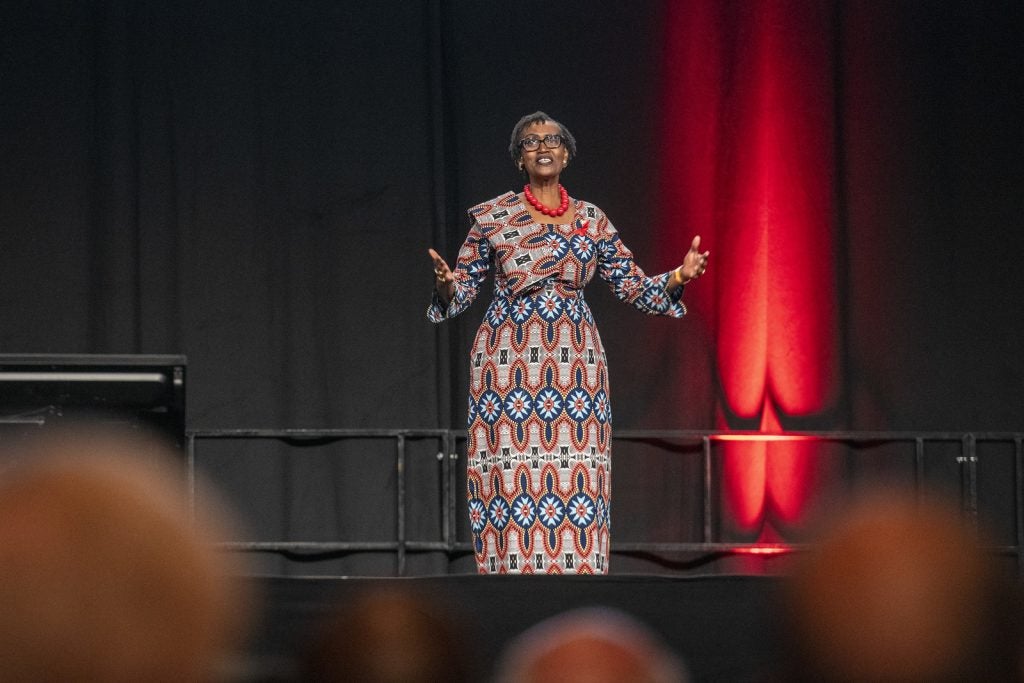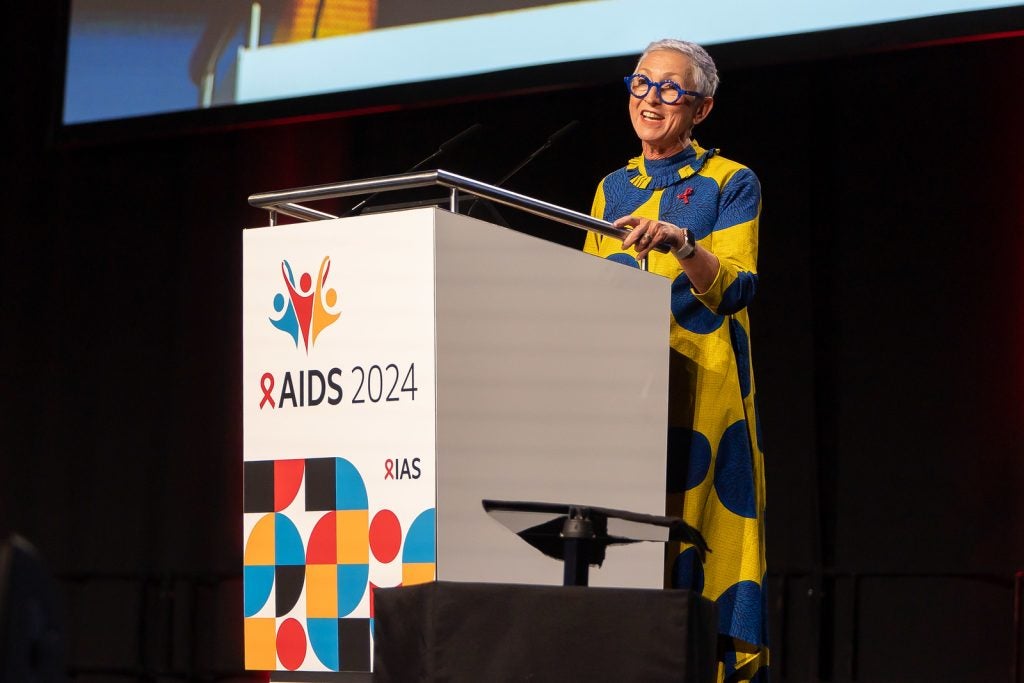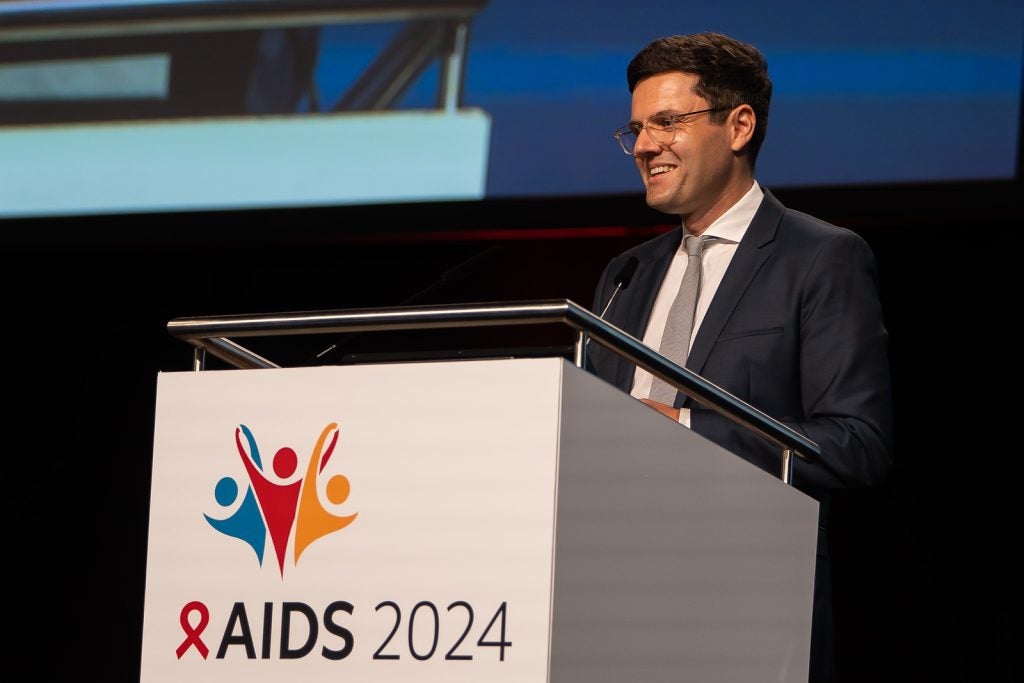
The International AIDS Society’s (IAS) 25th International Conference, AIDS 2024, was filled with calls to ensure at risk populations who are most at risk of human immunodeficiency virus (HIV) and acquired immune deficiency syndrome (AIDS) are at the top of the agenda for access to testing, treatment at trials.
AIDS 24, which took place in Munich from 22 to 26 July 2024, marked the first time a transgender male spoke at the opening ceremony. Jay Mulucha from Fem Alliance in Uganda, and ex-drug user, Anton Basenko from the Alliance for Public Health and INUPD in Belgium, took to the stage at the closing ceremony, .

Discover B2B Marketing That Performs
Combine business intelligence and editorial excellence to reach engaged professionals across 36 leading media platforms.
The opening ceremony was also interrupted by a transgender activism group who called for more transgender access to HIV medicines.
📢 Trans activists protest at the #AIDS2024 opening ceremony and call for equal rights
— IAC – the International AIDS Conference (@AIDS_conference) July 22, 2024
“Join the movement where everyone can be simply who they are!” pic.twitter.com/JPlvvJf85B
Not only this but there were sessions throughout the conference focused on ensuring at risk populations are able to access clinical research, as well as drug and test access.
Much of the agenda discussed new laws which have been introduced in countries in Africa, various US states and Ukraine, making it difficult for certain populations classified as higher risk from accessing HIV therapies.

US Tariffs are shifting - will you react or anticipate?
Don’t let policy changes catch you off guard. Stay proactive with real-time data and expert analysis.
By GlobalDataCall to Gilead
During the opening session, UNAIDS CEO Winnie Byanyima called on Gilead to make its PrEP lenacapavir available to those from more deprived countries with higher disease burden for an affordable cost, or allow generics to be developed in those countries.
“You have a miracle tool that could transform access for gay men, trans people, sex workers, for young women in Africa who could be freed from the stigma and fear of being attacked just for being seen swallowing tablets. Right now, Gilead, lenacapavir is priced for rich countries – this inequality never served us well in HIV response,” said Byanyima.

As they presented their full data from the trial, Gilead said it would work to make the drug available for these patients.
Gilead originally announced topline data from the PURPOSE-1 trial, showing lenacapavir prevented 100% of HIV cases in women in June.
Dr Linda-Gail Bekker, chief executive officer of the Desmond Tutu Health Foundation in South Africa, received a standing ovation from the crowd and other presenters, following her presentation of the data at the conference on 24 July.
The trial demonstrated zero infections in HIV prevention in women in the treatment group. Lenacapavir demonstrated superior prevention compared with once-daily oral Truvada and Descovy.
The trial also did not require patients to be on birth control, allowing Gilead to conduct analysis on the impact on lenacapavir in pregnant women and their children. There were 510 pregnancies among 487 participants, with 193 among women in the lenacapavir group. Gilead said this observation is ongoing and will include evaluation of the presence of lenacapavir in breast milk and infant exposure.
Bekker added that the company needs results from two pivotal trials to file for regulatory approval, with results from the PURPOSE 2 trial (NCT04925752) expected in late 2024 or early 2025. PURPOSE 2 is A Phase III study assessing twice-yearly lenacapavir for PrEP among men, transgender men, transgender women, and gender non-binary patients who have sex with partners assigned male at birth.
Decriminalise to improve access
A session, named ‘Punish or Protect? Laws in the lives of key populations” explored how decriminalising certain activities in countries could improve access to HIV testing and treatment for those who would be criminalised for their activities which led to infection, such as sex work and drug taking.

Moderator of the panel, Zuzile Africa Melane, from Primedia Broadcasting in South Africa said: “We know that stigma discrimination and criminalisation block key populations and people living with HIV from accessing treatment and services and this is crippling global efforts to end HIV and AIDS. Secondly, we know that discriminatory policies correlate with lower rates of HIV treatment and viral suppression. Third, we know 55% of all new HIV infections in 2022 occurred among key populations and their sexual partners and this includes 80% of all HIV infections outside of sub-Saharan Africa.”
The panel included speakers from Ukraine, which increased punitive measures on opiod users, upping the criteria for a prison sentence for possession of 0.005g of heroin compared to the UK’s 2g; from South Africa where sex work remains criminalised; from Jamacia where the constitution states that LGBTQ+ people do not have the same rights; and from Nepal, where the recent Criminal (Code) Act, 2074 (2017) includes a number of sections potentially criminalising people living with HIV.
Ebbie Iheanyi from Elsabe Klinick & Associates, said several groups came together to present a statute to abolish criminal penalties for sex work in November 2022 but this was handed back to them for amendments.
“#PutPeopleFirst Now!”
— IAC – the International AIDS Conference (@AIDS_conference) July 26, 2024
– @allianceforph’s Anton Basenko #AIDS2024 pic.twitter.com/3T6Qg7dbHH
Iheanyi says: “It has taken us years, more than 20 years in advocating the call for decriminalisation. Criminalisation itself continues to negatively impact those involved in same sex work with, HIV, STIs and drugs. There are a lot of challenges we face with stigma. We submitted the bill at parliament with support of other task forces and organisations who are pro sex work. It was not accepted as some part was missing.”
The advocates are hopeful that once amendments have been made it can be introduced and potentially broadened out to other African nations.
Hon. Justice Adrian Saunders, President of the Caribbean Court of Justice, Trinidad and Tobago agreed that in the world of progression, some laws should be reviewed.
“Laws can become less appropriate for society, they can become irrelevant and be an impediment to social progress and some of these laws have so become. At the time they were made, some of these laws were not very progressive,” said Saunders.
Elsewhere on the agenda
Another big announcement at the conference was that a seventh person had been ‘cured’ of HIV, with no viral load detected in the patient nearly six years post stem cell transplant.
Presenting on July 24, Dr. Christoph Gaebler, chief medical information officer at University Hospital rechts der Isar in Munich, Germany, said that the case is so impressive as the patients transplant was the first successful case using a heterozygous donor.

“A HIV cure should enable a patient living with HIV to stop therapy and live a long and healthy life. The next Berlin patient is coming close to six years in remission – we have a potential HIV cure. We have observed prolonged remission without ART following stem cell transplant. We are not able to measure any HIV viral load. We believe the allogeneic transplant can really contribute to HIV research,” said Spinner.
The patient, a white male born in 1964 with the CCR5 WT/Delta 32 genotype, had been diagnosed with HIV in 2009
The patient was later diagnosed with acute myeloid leukemia (AML) and required a stem cell transplant. Clinicians sought to find a donor who had the double mutation but were unable to, so settled on a female heterozygous donor with WT/Delta 32 genotype.
Previously, all transplants which have followed with successful HIV remission have been using donors with the double mutation (homozygous) CCR5 Delta 32. The single mutation is far more common, providing clinicians with a larger pool of donors.
Following the transplant, which was conducted in 2018, the patient stopped antiretroviral therapy (ART).
All tests conducted from the year of transplant until July 2024 show no signs of viral load in the patient, including in blood plasma and the HIV reservoir, both tests measuring too low a load to be detected.
“The next Berlin patient chose to stay anonymous but he asked us to say a healthy person has many wishes, a sick person only one,” Spinner concludes.
The first Berlin patient, Timothy Ray Brown, was diagnosed with HIV in 1995 and acute myeloid leukemia (AML) in 2006. Following a stem cell transplant in 2007, Brown remained HIV free until his death in 2020 following an AML relapse.
Currently, these transplants are only being used in patients with other conditions which require stem cell transplants.





